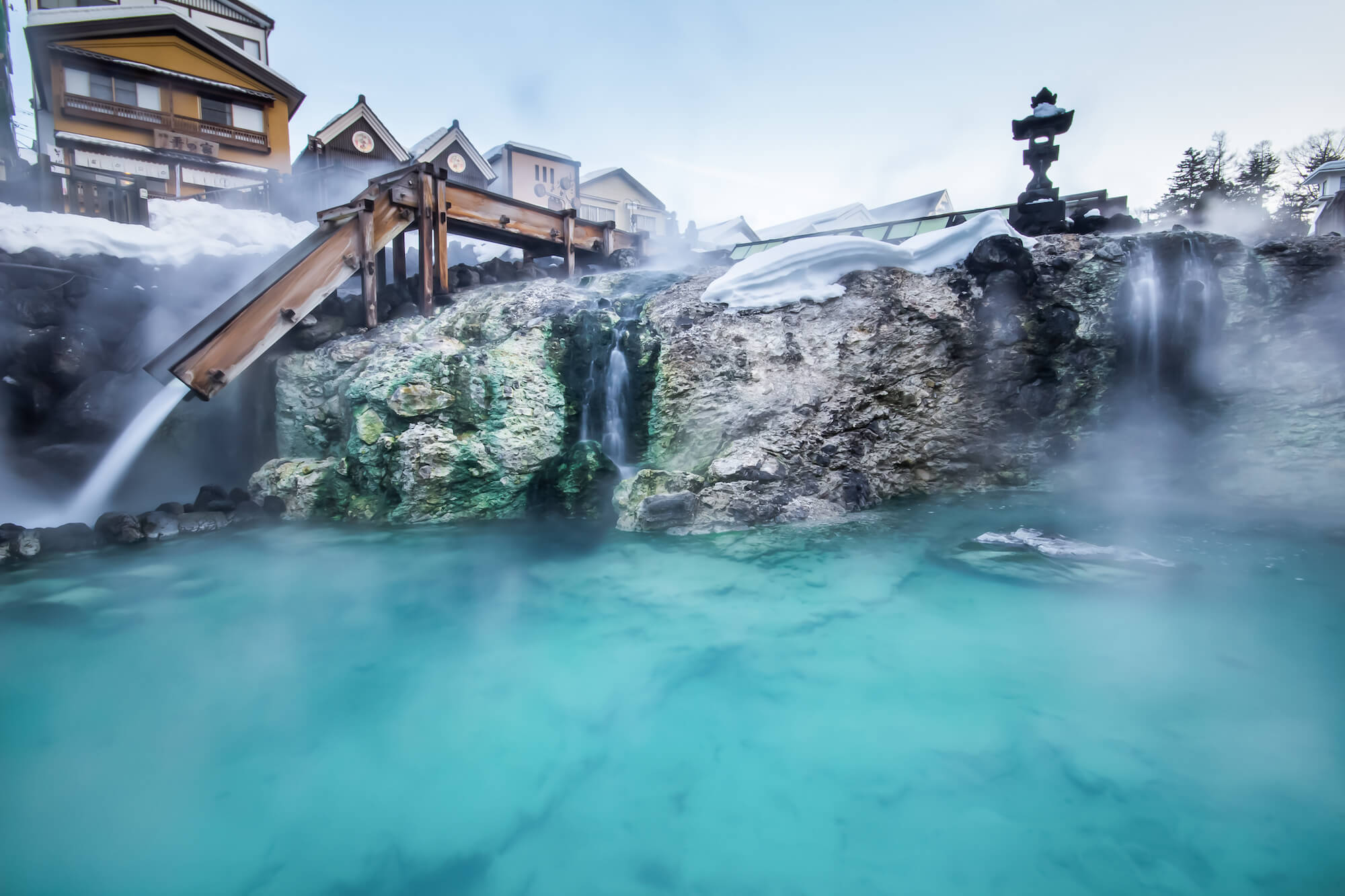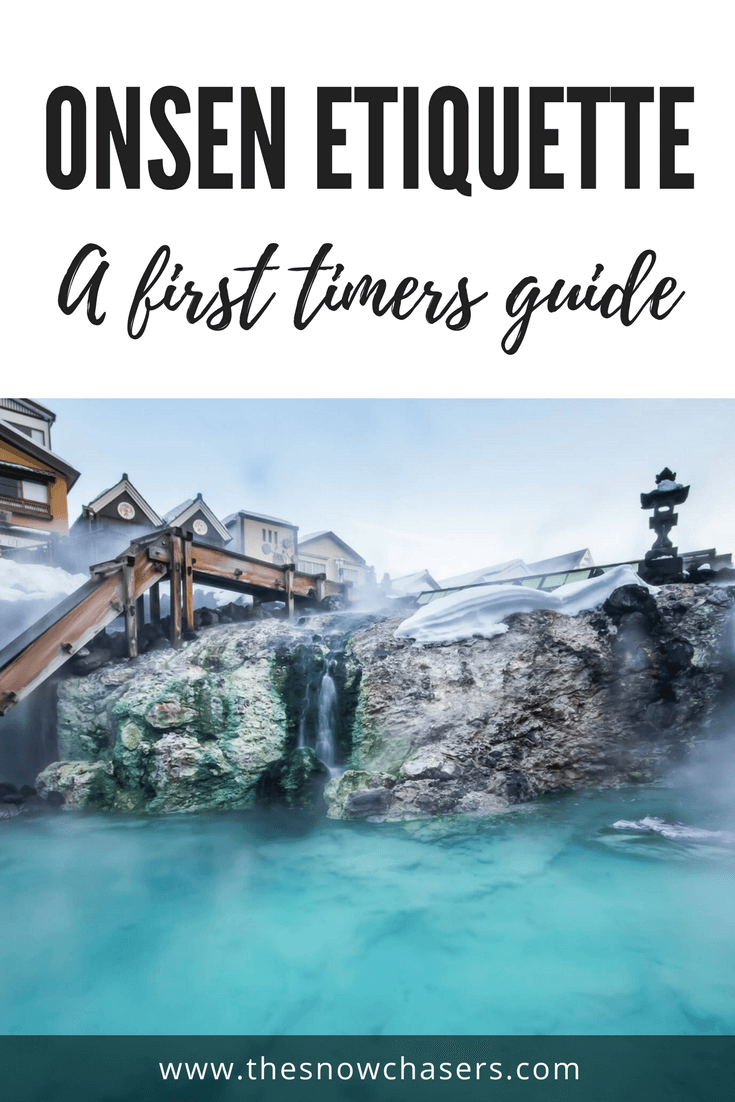Japanese Onsen Etiquette: A First Timers Guide

Updated 11th January 2019
The Onsen is a big part of Japanese culture.
You want to try it. But it's also a little daunting. Am I right?
The Japanese Onsen is a beautiful tradition but if you haven't been in one before, the whole idea of it can be a little scary. First of all, there's the fact you have to nude up. For many of you, that may not be an issue - you're used to cruising around in change rooms in your birthday suit. But for someone like me who was bought up in a conservative environment, it makes me a little uncomfortable. I mean, I can count on one hand how many times I have seen my parents in pyjamas let alone in swimwear! It's not a lot!
Then there are all the rules and processes and you are petrified of getting it wrong. You don't want to be THAT guy right?
Mick and I tried our first Japanese Onsen in Osaka a few years back. It was in an airport hotel so they were used to tourists and made us feel a bit more at ease. We thought why not, let's do this! We robed up and had a bit of a laugh as we walked through the hotel in our robes (and nothing else). There was a male onsen and a female onsen. We decided to separate, do a quick reccy and meet back outside to decide if we were really going to do it. We popped in, had a quick look, met outside and decided to go for it.
It was a pretty cool experience and we're both glad we did it. It definitely felt a little strange at first. But once you realise the only thing making you feel strange is your own mindset, you are able to let go and embrace the entire cultural experience and soak in the health benefits of the onsen.
Before you head into your first onsen, here's everything you need to know.
What is an Onsen?
An onsen is a natural hot spring bath. With Japan being a volcanically active country, there are more than 26,000 onsens - it's easy to see why they are such a big part of Japanese culture.
Onsen water is geothermally heated beneath the ground. An official onsen will contain at least one of 19 designated chemical elements naturally occurring in hot spring water, and the water will be at least 25C when it comes out of the ground.
A rotenburo is an outdoors onsen whilst a sento is an indoor public bathhouse supplied by ordinary heated water.
What's so good about an onsen?
Have you ever soaked in a hot tub after a day of skiing or snowboarding? Isn't it just the most amazing feeling, especially if you are feeling a bit achy? Well, the onsen is like a hot tub on steroids. The natural spring water contains a multitude of minerals that are thought to be therapeutic.
In Japan, bathing in an onsen is also considered a form of medical treatment - also called Balneotherapy. Peer reviewed medical studies have shown positive results for the treatment of dermatologic and musculoskeletal diseases such as psoriasis, dermatitis, osteoarthritis and lower back pain from bathing in thermal water.
A way to relax and recover after a powder day? Yes, please!
How Do I Onsen?
Onsen etiquette can differ slightly from onsen to onsen but the basics are still the same. My biggest advice is to follow what the locals do and read the rules of each onsen you go into just in case.
On arrival
Some onsens will provide you with a towel, washcloth, soap and shampoo. If not, most places will rent them to you or you can bring your own.
Make sure you take your shoes off before going into the main part of the onsen. There will be a changing area where you will leave all of your belongings.
Strip off! All of it.
Clean yourself before going into the onsen
This is a really important step - washing in the onsen bath is frowned upon! It's important to keep the onsen water as clean and pure as possible.
There will be areas around the onsen where you can wash yourself. They will be obvious. Sit down on the stool or floor (standing up is bad manners) and wash yourself thoroughly with soap, ensuring all the soap is rinsed off so it doesn't end up in the onsen water.
Use your large towel to dry yourself and leave it in the changing room with your clothes. The small towel can be used as a modesty towel to cover up as you walk to the onsen. You can take it to the onsen with you, but it must not go into the onsen. Most people put them on their heads or you can leave it outside on the edge of the bath.
Getting into the onsen
Refrain from letting your hair go into the bath water - again this is to keep the water clean.
Ease in slowly - no dive bombs! Relax, enjoy and feel all that goodness going into your muscles.
Conversation is ok, but being loud and rowdy isn't. It is a place of relaxation much like a beauty spa so be sure to behave accordingly.
Don't get on the booze. For the same reason as above, plus being drunk and sitting in hot water is not a good mix.
Don't take photos. I hope I don't have to explain why...
Don't swim. Just chill.
Getting out of the onsen
Get out with the same grace as you did getting in. Be careful as the floor may be slippery.
Wipe off as much sweat and water as you can with your face cloth before you go into the change room.
You can also have a rinse after your onsen or if you are returning to the onsen after using a steam room or sauna.
Some places provide relaxation areas so go ahead and make the most of them!
What about tattoos?
Tattoos are associated with the Yakuza (Japanese mafia) and as such, there are many onsens which ban anyone with tattoos from entering. Having said that, with the increase in overseas visitors, there are some places which will allow tattoos. Small tattoos may be able to be covered up with a bandage.
Having acquired quite a few tattoos since my last visit, I reached out to the team at Nozawa Holidays for advice. Mark and Yoshiko were super helpful and advised, "In Nozawa Onsen, we have had overseas guests coming for a number of years now and most locals are now used to it and they understand that most overseas guests are not Yakuza related. Some older locals may not be 100% happy with it but they turn a blind eye most of the time. I always suggest if they don't feel welcome to move on to the next onsen".
My advice is to do some research about the place you plan to onsen - ask a local, observe and be respectful. If you have a small tattoo, you could probably get away with it. I was pretty adamant I wasn’t going risk offending anyone when we went to Nozawa Onsen but for some reason, I plucked up the courage and gave it a shot. The first onsen I went to had no one else in it, so that was obviously ok. The second one had two people in it, one being an elderly woman. Uh oh, I thought. But she was so welcoming and helpful, guiding me through what to do with hand gestures and putting me at ease.
Another option is to go to a private onsen. You'll be behind closed doors and won't offend anyone.
Male and Female Onsens
Most onsens are same sex but there are some which are for both males and females (konyoku). At Nozawa Onsen, there is a place called Spa Arena which has an onsen hat allows male and females, as well as swimwear. If you're not quite ready for the authentic experience, this may be a great stepping stone!
For a real inside look, check out this video from Nozawa Holidays. Warning: there is nudity!
So there you go, what do you think? Are you ready to onsen? I hope you have found this helpful and feel more comfortable now you know what to expect for your first onsen experience. Let me know if you have questions and if you are a seasoned onsen goer, share your tips!
Jen
Save this for later on Pinterest!
Jen spends most of her time following Mick around the mountain, often unintentionally off jumps and cliff drops. Currently on a mission to prove that you’re never too old to try freestyle. Aside from snowboarding, a little obsessed about tattoos, CrossFit, saving animals, learning to play the guitar and clean eating. Web designer and digital marketing nerd.






